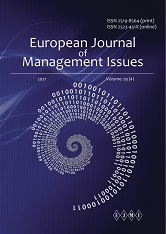The State of Dissemination of Open Research Data in Ukraine and the World: Bibliometric Analysis
The State of Dissemination of Open Research Data in Ukraine and the World: Bibliometric Analysis
Author(s): Anton Boiko, Olha Kramarenko, Sardar ShabanovSubject(s): Business Economy / Management, Electronic information storage and retrieval, Methodology and research technology
Published by: Дніпропетровський національний університет імені Олеся Гончара
Keywords: open science; research data management; data sharing; research data repositories; publications with datasets;
Summary/Abstract: Purpose: To determine the current state of development of open science in the paradigm of open research data in Ukraine and the world, as well as to analyze the representation of Ukraine in the world research space, in terms of research data exchange. Design / Method / Research Approach: Methods of synthesis, logical and comparative analysis used to determine the dynamics of the number of research data journals and data files in the world, as well as to quantify the share of research data repositories in Ukraine and the world. Trend and bibliometric analysis were used to determine the share of publications with their open primary data; analysis of their thematic structures; identification of the main scientific clusters of such publications; research of geographic indicators and share of publications by research institutions. Findings: The study found a tendency to increase both the number of data logs and data files in Dryad (open data repository). The results of the analysis of the share of data repositories indexed in re3data (register of research data repositories) show that 51% of the total number are repositories of data from European countries, with Germany leading with 460 repositories, followed by the United Kingdom (302 repositories) and France (116 repositories). Ukraine has only 2 data repositories indexed in re3data. The trend of relevance of data exchange is confirmed by the increase of publications with datasets for the last 10 years (2011-2020) in 5 times. Research institutions and universities are the main sources of research data, which are mainly focused on the fields of knowledge in chemistry (23.3%); biochemistry, genetics and molecular biology (13.8%); medicine (12.9%). An analysis of the latest thematic groups formed on the basis of publications with datasets shows that there is a significant correlation between publications with open source data and COVID-19 studies. More than 50% of publications with datasets both in Ukraine and around the world are aimed at achieving the goal of SDG 3 Good Health. Theoretical Implications: It is substantiated that in Ukraine there is a need to implement specific tactical and strategic plans for open science and open access to research data. Practical Implications: The results of the study can be used to support decision-making in the management of research data at the macro and micro levels. Future Research: It should be noted that the righteous bibliometric analysis of the state of the dissemination of data underlying the research results did not include the assessment of quality indicators and compliance with the FAIR principles, because accessibility and reusability are fundamental components of open science, which may be an area for further research. Moreover, it is advisable to investigate the degree of influence of the disclosure of the data underlying the research result on economic indicators, as well as indicators of ratings of higher education, etc. Research Limitations: Since publications with datasets in Scopus-indexed journals became the information base of the analysis for our study, it can be assumed that the dataset did not include publications with datasets published in editions that the Scopus bibliographic database does not cover. Paper type: Theoretical
Journal: European Journal of Management Issues
- Issue Year: 29/2021
- Issue No: 4
- Page Range: 209-217
- Page Count: 9
- Language: English

